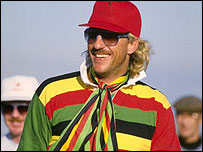The Mother-in-Law of All Tours: England in Pakistan 1984
David Taylor |
Bob Willis’s tenure as England captain from 1982-84 was one of mixed success. His side won home series against India, Pakistan and New Zealand, while losing the Ashes in Australia in 1982-83 and the following winter becoming the first England team to lose series in New Zealand and Pakistan. The loss to New Zealand came about after a catastrophic display at Christchurch that outdid, if that seems possible, any of their incompetence of the series just gone. On a spicy pitch and omitting a spinner in favour of an extra batsman, they allowed New Zealand to make 307 at more than four an over, Richard Hadlee hitting 99 from just 81 balls, and were then bowled out for 82 and 93, the match finishing in just twelve hours’ playing time. The other two Tests were draws which never looked like reaching a positive outcome, although England took a big lead in the first game only to be foiled by a marathon knock from Jeremy Coney.
So on the side went to Pakistan, and were playing in the first Test at Karachi only five days after losing to New Zealand in the third and final one-day international. That there was no ‘warm-up’ match was down to the players, who had requested an itinerary that would enable them to spend Christmas, if not New Year, at home. After long tours of India and Australia in the previous two winters this was understandable (although there were many changes of personnel between Keith Fletcher’s team and this one) but it meant going into the Pakistan series somewhat ‘undercooked’ as they like to say today. In addition, as what can only be seen now as a money-saving exercise, there were only fifteen in the squad. There was no understudy available to 42-year-old Bob Taylor – as Wisden put it, the selectors took a calculated risk on his legendary fitness – although Paul Downton, coaching in South Africa, was asked to act as a standby, while Lancashire opener Graeme Fowler had kept wicket in a few one-day county games. As in the previous winter the players who had gone to South Africa in early 1982 – including Graham Gooch and John Emburey – were unavailable as they were serving a three year ban. Nevertheless Nick Cook had made a successful start to Test cricket against New Zealand in 1983, there were experienced batsmen in the shape of Derek Randall, Alan Lamb, Mike Gatting and vice-captain David Gower, while in the captain and Ian Botham England boasted two bowlers with 600 Test wickets between them, Willis having recently become only the fourth bowler anywhere in the world to reach the landmark of 300.
That first Test at Karachi was a most unusual one, especially for a part of the world where one was used to seeing high scores and few wickets. England, under-prepared surely, were bowled out for 182 and 159, the main destroyers being Abdul Qadir, who was expected to be a threat, and the experienced Sarfraz Nawaz, who took six in the match while conceding less than two an over. Gower passed 50 in both innings but had little in the way of support, the surprise move to open for Gatting proving of little benefit. Pakistan, missing Imran Khan and Javed Miandad through injury and Mudassar Nazar with illness, had something of a new look to them – including two batsmen England had not come across before in Ramiz Raja and Qasim Umar (Shoaib Mohammad made his debut in the third Test), a new left-arm quick bowler in Azeem Hafeez and a new wicket-keeper in Anil Dalpat, the first Hindu to play for Pakistan (India had a Muslim wicket-keeper, Syed Kirmani). The home side replied to England’s meagre total with 277, thanks to fifties from Mohsin Khan and the young Salim Malik, and an annoying wag of the tail supervised by Qadir, and were thus set only 66 to win. Wickets tumbled, mostly to Cook who added five to his first-innings haul of six, but Dalpat and Sarfraz held their nerve to secure a three-wicket win, Pakistan’s first on home soil against England and coming almost thirty years after surprising many with a series-levelling victory at the Oval. In a throwback to the troubled tour of 1968-69, the match was played amid tight security in the wake of students protesting at the government’s ban on student unions.
There followed a one-day international at Lahore. Taylor, having played in every match on the tour so far, was granted a rest and Fowler, who had missed the first Test, took the gloves. With only he and Lamb passing 20 though, England’s score was an inadequate 184 and Pakistan reached their target for the loss of four wickets. The teams then travelled to Faisalabad, which would a few years later be the setting for a stormy encounter between Gatting and Shakoor Rana (who had umpired at Karachi), but this time was to be memorable for different reasons. Ian Botham had already left for home after aggravating a shoulder injury picked up in New Zealand; on arrival in England he described Pakistan as “the sort of place to send your mother-in-law for a fortnight, all expenses paid.” The comment was widely reported in Pakistan and Botham apologised shortly afterwards, saying that he was at a low ebb after having to miss the rest of the tour. The Mail on Sunday printed allegations of drug-taking on the New Zealand leg (to which Botham responded by issuing a writ) and, just before the start of the second Test, illness and injury ruled out Willis and Norman Cowans. Suddenly England’s party of fifteen had been trimmed to twelve. Norman Gifford, assistant manager but still playing county cricket for Warwickshire, was put on standby as a possible third spin option.
After losing the toss England’s patched-up attack did better than might have been expected, reducing Pakistan to 70 for 3 before hundreds from Salim Malik, the third for a batsman not yet 21 and Wasim Raja, combined with fifties from Zaheer and Qadir saw them to 449 for 8 declared. Cook found wickets much harder to come by this time and Graham Dilley had the best figures, but he too succumbed to injury during the Test, and not only had to leave the tour but missed the whole of the following season, a cruel blow for him as well as for Kent and England. England replied with a solid effort from the top order and an innings of 152 from Gower, captaining for the second time in Tests. The bonus was a knock of 83 from Vic Marks at number eight; he and Gower added 167, a record for England against Pakistan. The threat of Qadir was blunted to the extent that he managed only one wicket in 51 overs. The visitors were able to claim a lead of 97 but time was running short, and with another good knock from Malik the home side were able to save the match comfortably.
And so the series concluded, with just a single day separating second and third, at Lahore. England made one change, Cowans returning in place of Dilley. Pakistan introduced Shoaib Mohammed, son of the great Hanif with that great burden to bear. They also picked an extra batsmen, a tactic commonly employed by sides one up in the series to this day of course, Ramiz coming in for spinner Tausif Ahmed – it meant that Zaheer Abbas, one of the finest batsmen ever to represent his country, found himself at number seven. Mohsin Kamal, Pakistan’s 100th Test cricketer, came in for Hafeez to open the bowling, and claimed the prize wicket of the new England captain as the tourists subsided to 83 for 5. There was a recovery from Fowler and Marks, who both made fifties and added 120, but England’s 241 looked inadequate, and after losing their openers cheaply Pakistan’s batsmen put together a solid display to take them to 138 for 3. Then the wickets started to fall, Neil Foster the main beneficiary this time – he picked up his first five-wicket haul and at 181 for 8 an upset seemed on the cards. The experienced pair of Zaheer and Sarfraz turned the game, the fast bowler batting none too elegantly but playing with increasing confidence as he went past his previous best of 55. An unlikely hundred loomed when he edged Chris Smith, bowling his first over of the series, to Gatting at slip. Another big hundred from Gower, who finished unbeaten on 173 – with an average of 112 for the series – and a third successive fifty from Marks enabled a target to be set – 243 from 59 overs. Generous certainly, but Pakistan had no need to chase and would not have bothered with anything testing. The gamble looked like backfiring when Mohsin and Shoaib started with 173 but after that wickets fell steadily, this time to Cowans, and Zaheer opted to settle for a 1-0 series win. England managed a win in the second one-dayer – Gatting took three wickets and hit an unbeaten 38 to claim the match award, while Fowler made a couple of stumpings. Taylor had played his last match for England, one memorable day as a substitute notwithstanding.
Bob Willis was relieved of the England captaincy for the home series against West Indies, and only played two more Tests. Gower, his replacement, endured a 5-0 ‘blackwash’ but for him the best of days were only a year away. Vic Marks never played another Test. With 78 wickets that summer and an average of 54 for Somerset he could hardly have done worse than some who were tried, but his role from now on was that of a one-day specialist. Whether his team-mate Ian Botham apologised to his mother-in-law, as well as to his “many friends in Pakistan”, is not recorded.





Love the title
Comment by G.I.Joe | 12:00am GMT 9 March 2014
I wouldn’t have said the first Test in NZ was *that* obvious a draw: NZ started the final day effectively 91-7 (and that was after a bit of a recovery).
Comment by AndrewB | 12:00am GMT 11 March 2014